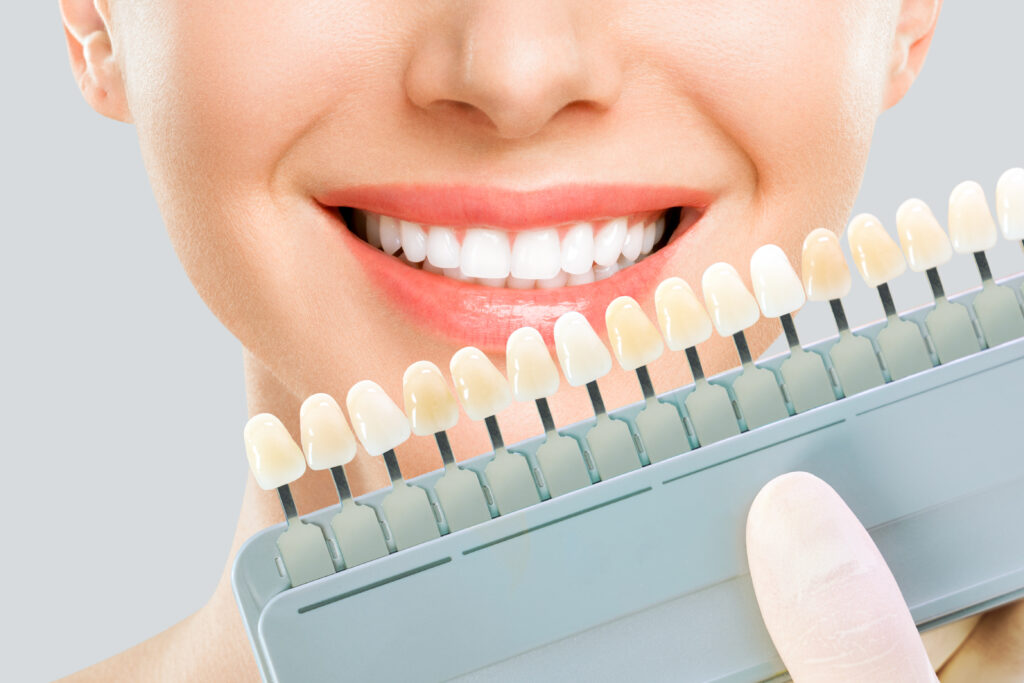Composite and Porcelain Veneers
- Home
- Composite and Porcelain Veneers

What Are Dental Veneers?
Dental veneers are thin layers of material, commonly porcelain or resin-composite, meticulously designed to fit over the surface of your natural teeth, especially your front teeth. These veneers play a crucial role in a smile makeover, enhancing the appearance of your smile while also providing a protective shield against potential damage to your teeth. With veneers, your front teeth can achieve an improved aesthetic, contributing to a comprehensive smile makeover that adds confidence and charm to your overall appearance.
The Purpose of A Dental Veneer
A cornerstone of cosmetic dentistry, dental veneers have a dual purpose.
Firstly, they are a therapeutic solution, addressing various dental problems such as discoloured teeth and chipped or broken teeth, effectively restoring your teeth’ natural function and appearance. Secondly, veneers play a significant role in aesthetic transformations.
Veneers offer a means to craft a symmetrical smile, becoming a powerful tool for those seeking to enhance their overall facial aesthetics and boost their confidence.
What Are the Different Types of Dental Veneers?
Dental veneers come in different types, each offering unique benefits and considerations. The two most common types are porcelain and composite veneers.
Porcelain Veneers
Porcelain veneers are made from a durable ceramic material that closely mimics the look and feel of natural tooth enamel.
Advantages
One of the biggest advantages of porcelain veneers is their ability to resist stains better than composite resin veneers.
Porcelain veneers also tend to have a longer lifespan, often 10 to 15 years, with proper care. Moreover, their resemblance to natural teeth in terms of colour and light-reflecting properties gives them a superior aesthetic advantage.
Disadvantages
On the downside, porcelain veneers are usually more expensive than composite veneers. Applying porcelain veneers is also more complex and time-consuming, often requiring at least two dental visits.
Additionally, porcelain veneers are irreversible since the procedure involves removing a small amount of natural tooth structure.
Composite Dental Veneers
A composite veneer is made from a tooth-coloured filling material bonded to the teeth.
Advantages
Composite resin veneers are typically less expensive than porcelain veneers and can often be applied in a single dental visit.
Composite veneers require less tooth enamel removal than porcelain veneers, making the procedure less invasive. Also, they can be repaired if damaged, unlike porcelain veneers, which would typically need replacing.
Disadvantages
Composite resin veneers may not last as long as porcelain veneers, often needing replacement or repair after 5 to 7 years. They are less stain-resistant than porcelain veneers and may not look as natural due to differences in translucency and texture.
Understanding the Dental Veneers Procedure
The procedure for applying dental veneers, whether they are made of porcelain or resin composite materials, is a meticulous process involving several stages. It requires an experienced cosmetic dentist adept at shaping and bonding veneers to fit perfectly over your existing tooth structure.
This comprehensive guide will provide a clear understanding of how veneers work and what you can expect during each phase.

Initial Consultation
The first step in the dental veneer procedure is the initial consultation with your dentist. This meeting involves treatment planning, where the dentist evaluates your teeth to ensure they are healthy enough for veneers and discusses your cosmetic treatment goals. The dentist may take X-rays or make impressions of your mouth and teeth. At Acts Dental Care in Perth, we understand that this consultation is the perfect opportunity to address any concerns or questions you may have about the veneer process.
Tooth Preparation
The dentist will remove a thin layer of natural enamel from the front surface of the teeth that will have veneers applied. This removal is necessary to make room for the veneer so that it doesn’t look bulky or unnatural.
It’s important to note that this is an irreversible procedure since the removed enamel cannot be replaced.
After the teeth are prepared, the dentist will take an impression of your teeth and send it to a dental lab, where your new veneers will be custom-made.
In the meantime, temporary veneers may be placed on your teeth to protect them.
Veneer Placement
Once your new veneers are ready, the dentist will check their fit and colour against your existing teeth. Adjustments can be made to ensure a perfect match. The teeth are then cleaned, polished, and etched to provide a strong bonding surface. The veneers are applied using a special dental cement, which is hardened with a special light that activates the chemicals in the cement, causing it to cure quickly.
Any excess cement is carefully removed, and final adjustments are made as needed. Veneers cover the front surface of your teeth, effectively concealing a range of dental imperfections, including discoloured teeth, chipped teeth, misshapen teeth, and worn or slightly crooked teeth, contributing to a complete smile makeover.
Follow-up Care
After the procedure, a follow-up visit is necessary to ensure your gums are responding well to the presence of your veneers and that the placement has been successful.
It’s essential to remember that maintaining good oral hygiene is vital even after getting veneers. Although veneers protect your teeth, your actual teeth still require regular care.
Think of dental veneers as a long-term investment in your smile. With the proper care and attention, they can remain a part of your smile for many years.
Always remember that veneers are not a one-time fix-all; they require regular check-ups with your dentist and good oral hygiene practices to maintain their look and longevity.
A dental crown might be a better alternative than a veneer in some instances. A crown is also a cosmetic treatment, covering the entire tooth rather than just the front surface.
Our Perth cosmetic dentists will be able to guide you on the most suitable treatment for your dental condition.
Porcelain Veneers Cost vs Composite Veneers Cost
When selecting between a porcelain veneer and composite veneers, the cost is an essential factor to consider.
In Australia, the average cost for a single porcelain veneer may be around $1200, while a single composite veneer cost a few hundred dollars.
However, these prices can vary from practice to practice. Crucially, the total cost for your dental veneers depends on the type of veneer and how many veneers you require for your cosmetic dentistry treatment.
Contact us at (08) 9474 5083 to receive more information.
Who is a Good Candidate for Dental Veneers?
A good candidate for dental veneers typically has the following characteristics:
Good Oral Health: Dental veneers are a cosmetic procedure, so your teeth and gums must be healthy before you get them. Issues like gum disease, tooth decay, or root canal infection must be addressed before considering veneers.
Adequate Tooth Enamel: Since the veneer procedure involves removing a thin layer of enamel to accommodate the veneer, you must have enough enamel. If the enamel is too thin or worn down, there may be better options than veneers.
Good Oral Hygiene Habits: Proper oral care is essential for maintaining veneers, including brushing and flossing daily and regular dental check-ups.
No Teeth Grinding or Clenching Habit: People who grind or clench their teeth may not be suitable candidates for veneers as these habits can cause veneers to crack or chip. If you have a known issue with grinding or clenching, your dentist may recommend treating this problem before proceeding with veneers.
Realistic Expectations: Veneers can significantly improve the appearance of your teeth, but they must be cared for properly and may need to be replaced in the future. Understanding the process and having realistic expectations about the results and upkeep is essential.
It’s important to have a thorough consultation with a cosmetic dentist who can evaluate your circumstances and help you determine if veneers are the right solution.

Frequently Asked Questions
Below are some commonly asked questions about dental veneers to further enhance your understanding.
What Are No Prep Veneers?
No-prep veneers are a type of dental veneer that requires little to no enamel removal from your existing teeth. As the name suggests, these veneers require no preparation or minimal preparation of the tooth surface, which significantly differs from the application of traditional porcelain veneers.
Applying traditional veneers typically involves the dentist removing a small amount of enamel from the front of your teeth and placing temporary dental veneers. In contrast, your permanent ones are being crafted in a dental lab. This process is necessary to make room for the veneer and ensure a natural and not overly bulky appearance.
No-prep veneers are ultra-thin, meaning they can be applied directly to the teeth without any removal or only minimal shaving of the enamel. That makes the procedure faster and less invasive than the traditional veneer process. The major advantage of no-prep veneers is that the procedure is reversible since no or little tooth structure is removed. However, only some are suitable candidates for no-prep veneers.
What Are Temporary Veneers?
Temporary veneers are short-term substitutes applied after a dentist prepares your teeth for permanent veneers but before the permanent ones are ready. They’re made from acrylic, offer a preview of the final look, and protect the prepared teeth. They’re removed when the permanent veneers are ready to be bonded.
Can Dental Veneers Fix Crooked Teeth?
Dental veneers can be used to address cosmetic concerns like crooked teeth. However, they’re generally recommended for teeth that are only slightly crooked. Veneers can create the illusion of straightness by covering the front surface of your teeth.
However, they cannot move or align your teeth as other orthodontic treatments like braces or clear aligners can. More comprehensive orthodontic treatment may be needed for severely crooked or misaligned teeth.
Do Veneers Look Like My Natural Teeth?
A key goal of dental veneers is to mimic the look of your existing teeth. They are custom-made to match your natural teeth’ colour, shape, and size, making them blend with your smile. A skilled dentist can craft veneers that are virtually indistinguishable from natural teeth to the casual observer.
Porcelain veneers are highly stain-resistant and do not discolour easily. However, the cement used to bond them can stain over time, especially if frequently exposed to coffee, tea, tobacco, or other staining substances. Composite veneers, while more prone to staining than porcelain, can have their colour restored with professional cleaning. Regular dental check-ups and good oral hygiene can help maintain the appearance of both types of veneers.
Can You Whiten Veneers?
You cannot whiten veneers with teeth whitening. Veneers are made of materials that do not respond to teeth-whitening agents the way natural tooth enamel does. If your veneers have become discoloured or stained over time, it’s best to consult your dentist about possible solutions, including replacing them.
Can Veneers Be Removed or Replaced?
Before veneers are applied, thin layers of the tooth enamel are permanently removed. If veneers are removed, the teeth underneath will be more susceptible to decay and damage, and they will typically look different than before the veneers were applied. For these reasons, once the veneers are removed, the teeth should not be left without veneers or some other form of dental restoration.
If a veneer breaks or becomes discoloured, it’s often recommended to replace it for aesthetic reasons. Replacing a veneer involves removing the old one, preparing the tooth again, and fitting a new veneer. This process can take a few dental visits. That is why getting and replacing veneers is often considered a permanent decision, and it’s important to understand this commitment before deciding on this treatment.
If you have concerns about your dental health or are considering a treatment like veneers, it’s best to consult a dental professional. They can provide advice tailored to your circumstances.
Do Veneers Hurt?
Getting veneers should not be painful because the dentist typically uses a local anaesthetic to numb the area during tooth preparation. Some people may experience mild discomfort or sensitivity after the anaesthetic wears off or during the adjustment period following veneer placement. However, any pain should be temporary. If pain persists, it’s important to consult with your dentist.
How Long Do Veneers Last on Your Teeth?
The lifespan of dental veneers can vary greatly depending on the type of veneer, the care they are given, and individual factors such as a person’s oral health and habits.
On average, porcelain veneers last 10 to 15 years, while composite resin veneers usually last between 5 to 7 years with proper care. It’s important to note that while veneers are durable, they are not indestructible. They can chip or break, particularly if subjected to excessive force from teeth grinding or biting on hard objects.
Good oral hygiene practices, including regular brushing and flossing and regular dental check-ups, can help extend the lifespan of veneers. It’s also recommended to avoid activities that can damage veneers, such as using your teeth to open packages or biting your nails.
What Are Alternatives To Veneers?
There are several alternatives to veneers that can address similar dental concerns. These include:
Teeth Whitening: If discolouration is the main concern, professional teeth whitening can be a simpler and less invasive option. However, it may not be as effective for severe or internal stains.
Dental Bonding: This procedure involves applying a tooth-coloured resin to the tooth and shaping it to improve its appearance. It’s less expensive than veneers but may not last as long.
Dental Crowns: Crowns cover the entire tooth, not just the front surfaces like veneers. They can be a better option for teeth that are significantly damaged or decayed.
Orthodontic Treatment: Orthodontic treatments like braces or clear aligners can be a good alternative for misaligned or crooked teeth. They can move teeth into correct alignment over time, but the process can take longer than applying veneers.
Each of these alternatives has its advantages and disadvantages, and what’s best will depend on the specific dental issues, the patient’s overall oral health, and personal preferences. It’s always best to discuss these options with a dental professional to make the most informed decision.
Why Choose Our Clinic for Your Veneer Treatment?
At Acts Dental in Perth, we specialise in creating beautiful, personalised smile makeovers using high-quality porcelain or resin composite veneers. Our experienced team is dedicated to providing top-tier veneer treatments, ensuring your new smile looks natural, functions seamlessly, and lasts for years to come. Unlock the full potential of your private health insurance by choosing us as your preferred provider; our recognized partnership with Bupa, Medibank, HBF, HCF, and NIB ensures that you receive substantial benefits while enjoying exceptional dental care tailored to your needs.
We prioritise your dental health and offer comprehensive care to keep your teeth healthy beneath your veneers. Ready to invest in your smile?
Contact us today at (08) 9474 5083 to schedule your initial consultation at Acts Dental, where we turn your dream smile into a reality.
